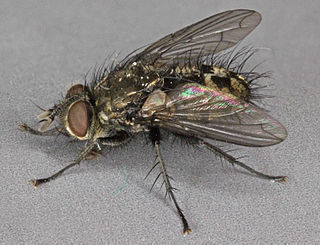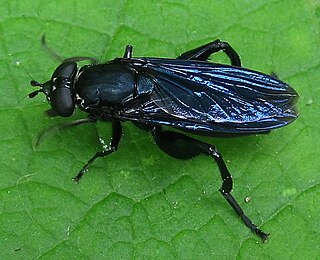
Daniel William Coquillett was an American entomologist who specialised in Diptera. He wrote a revision of the dipterous family Therevidae and many other scientific papers in which he described many new species and genera of Diptera. Coquillett was also the first to attempt fumigation with hydrocyanic acid as a means for controlling citrus scale insects. He experimented in the Wolfskill orange groves where he was supported by the foreman and later quarantine entomologist Alexander Craw in 1888–89.

Silvius is a genus of flies in the family Tabanidae.
Ametadoria is a genus of flies in the family Tachinidae.
Clairvillia is a genus of flies in the family Tachinidae.

Nilea is a genus of flies in the family Tachinidae.

Panzeria is a genus of flies in the family Tachinidae.

Siphona is a genus of flies in the family Tachinidae.
Siphosturmia is a genus of flies in the family Tachinidae.

Lypha is a genus of flies in the family Tachinidae.

Chaetostomella is a genus of fruit flies in the family Tephritidae.

Xyphosia is a genus of the family Tephritidae, better known as fruit flies.
Xyphosia punctigera is a species of tephritid or fruit flies in the genus Xyphosia of the family Tephritidae.

Criorhina is a genus of hoverflies. Medium to large sized species, black or greenish black, with or without light ground markings mimicking bumblebees. The head is much flattened and broader than the thorax. The antennae are situated upon a prominent conical frontal process, The face is moderately produced below the eyes, downward or forward, in profile. The eyes are bare. The abdomen is elliptical or very short oval. Larvae found in rot holes or decaying hardwoods

Chalcosyrphus is a genus of hoverflies in the subfamily Eristalinae. Many species exhibit some degree of mimicry of various sawflies and other hymenopterans and are often brightly coloured or metallic in hue. The adults are similar in structure and behavior to the related genus Xylota but differ in larval morphology. They can be found throughout Europe, Asia, and North America and seem to prefer damper, boggy habitats. The larvae are saproxylic feeders in rotten wood in these habitats.

The Metopininae are a subfamily of flies in the family Phoridae.
Monoceromyia pleuralis is a hoverfly that occurs in Japan. It is mostly black with yellow markings and brown markings on its wings. It was originally described by Coquillett in 1898 as Sphiximorpha pleuralis, but that genus was later lumped into Monoceromyia by Shannon.

The Metopininae is a tribe of flies in the family Phoridae.
Chaetostomella vibrissata is a species of tephritid or fruit flies in the genus Chaetostomella of the family Tephritidae.
Chalcosyrphus longus is a species of hoverfly in the family Syrphidae.
Xylota coquilletti is a species of hoverfly in the family Syrphidae.










